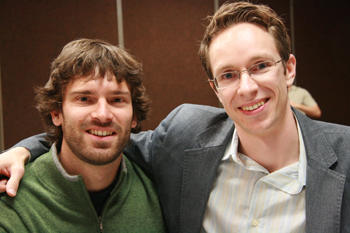A good idea is not enough to win the $10,000 top prize at UC Santa Cruz’s Business Design Competition, managed and co-sponsored by the UCSC Center for Entrepreneurship.
The competition is so fierce that the winner must have a clear, competitive advantage.
Such was the case for Quaest, this year’s winning team, consisting of Paul Abumov, a UCSC engineering graduate student, and Nicolas Petitclerc, who has a Ph.D. in physics and astronomy from McMaster University.
The team did more than impress the judges with their big idea -- a scanning and digital recognition technology designed to grade visual or "open-ended" test responses. Their product helps free teachers from the constraints of multiple-choice response forms like Scantron.
Center for Entrepreneurship director Dan Heller said the team has another, decisive edge that put them over the top: their idea is protected. A patent application for their product has already been filed and is considered pending.
"Many times, if you don’t have a patent to protect you in the beginning, even if you come up with a great idea, someone else will try to do it cheaper, better, faster than you can," Heller said.
"This is the most important aspect of running this (entrepreneurship) program inside UCSC," Heller continued. "Because of the weight of the UC system, it is much more difficult to infringe upon the patent. You need to have the 800-pound gorilla standing in the middle of the room, and that is what the UC system represents."
Their patent status helped sway a distinguished panel of judges, including Mike Frumkin, senior director of engineering at Google; Subhas Desa, a UCSC technology and information management lecturer; Ross Johnson, chief executive officer of DiskCorp; and Steve Bach, chief financial officer of DiskCorp.
The award is a career changer, said Abumov, who has been thinking about getting an engineering job. Instead he’ll work hard to make his fledgling business a success. "It’s going to take some effort to bring this up to speed."
This annual event is part of a curriculum that encourages students to build teams, and collaborate with other scholars from various disciplines. The goal is to build a potential business around an innovation, including a new or proposed technology.
Heller manages the competition along with economics lecture Mary Flannery and organizational management lecturer Kathi Lovelace.
The participants took a voluntary extracurricular class that met weekly at the UCSC campus, enabling them to brainstorm business ideas, create presentations to attract team members, then mold and shape their ideas into business models.
Flannery enjoyed watching the projects take shape during the classes.
"The thinking became a lot more clear,” she said. “It’s important for them to examine the market, and make sure that what they are thinking about the market is really true."
She was struck by the number of younger students who entered the competition this year. "We’re trying to develop a culture of entrepreneurship, to have students thinking that way throughout their college career."
Last year’s winner was A Cappella Records, which champions, promotes, and distributes the music of all-vocal ensembles.


